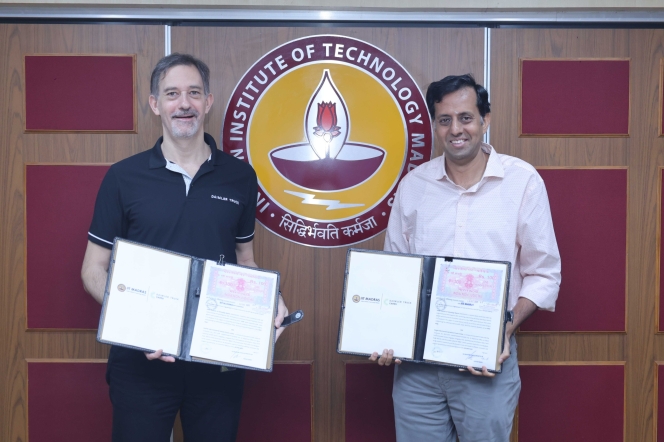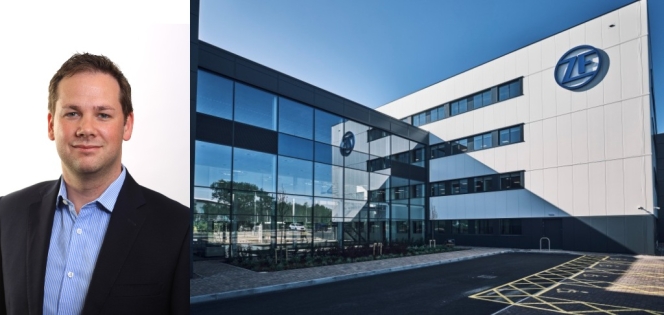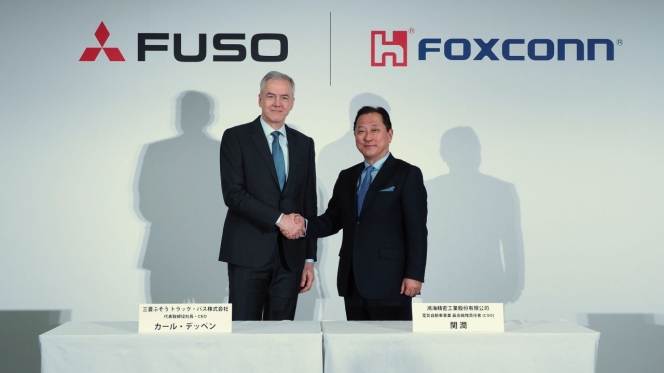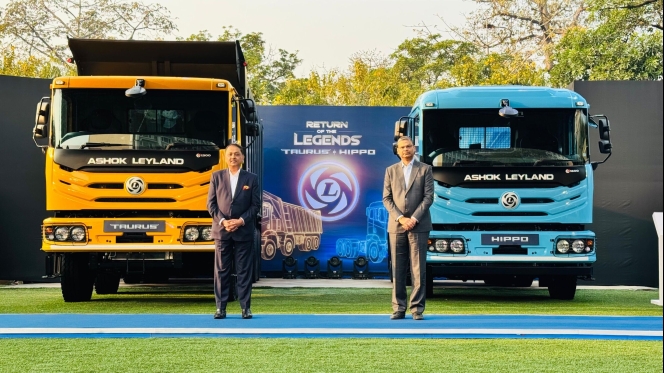
Volvo Eicher Commercial Vehicles Ltd (VECV) unveiled an electric light truck at the inaugural edition of Bharat Global Mobility Expo in January 2024. It was the only commercial vehicle manufacturer to unveil a new product. What it was not, was the only commercial vehicle manufacturer to display an alternative fuel technology vehicle.
If the passenger vehicles are witnessing the influx of new technologies in the alternative fuel technology domain and in ADAS, commercial vehicles (CVs) are quickly catching up. They too are attracting a lot of investment in technology to ensure a lower TCO and higher uptime. A look at the CVs that were launched in the post pandemic period and it would be clear that a lot of new technology on emissions, performance, efficiency, comfort and safety side has gone into CVs.
CVs also performed very well in terms of sales in the post pandemic period, albeit with a lower base level. They may not have attained the peak of 201-12, their performance was not lacking in lustre either. Segments such as buses showed a smart recovery from a very low base during the pandemic period. In FY2022-23, commercial vehicles recorded a growth of 34 percent with sales of 9,62,000 units as compared to the sale of 7,16,000 units in FY2021-22.
In the 2023 calendar year, 9,78,385 commercial vehicles were sold, marking a single digit growth figure. In the third quarter of FY2023-24, commercial vehicles recorded a growth of 3.5 percent with the sale of 2,35,167 units. While the SIAM President Vinod Aggarwal may have termed the performance in terms of sale of the auto industry as satisfactory, some analysts and observers have began expressing that a slowdown is on the way.
Leading ‘ratings’ organistion Crisil has mentioned in its recent report that revenue growth of CV makers will moderate to between five and seven percent in the next fiscal despite the operating margins being steady and the realisation being better.
With stable commodity prices, the moderation of between five to seven percent – against an estimated growth of nine percent in FY2023-24 – is likely be because of a hike in vehicle prices. What is ironic is that the growth moderation is expected to take place despite higher average realisations on the back of better growth in M&HCVs and stable raw material (especially steel, iron and aluminium) price.
With operating margins expected to be a good 10-11 percent in the next fiscal, Crisil’s study of four commercial vehicle manufacturers accounting for over 70 percent of the market share is indicative of a certain moderation in the commercial vehicle space.
M&HCV demand is contingent upon activity in key end-user infrastructure related sectors — roads, real estate, mining and construction, besides transportation and replacement demand. LCV demand, on the other hand, is dependent on last-mile connectivity and e-commerce players.
The Crisil report takes into consideration the four CV makers that account for over 70 percent of the market share. It states that a vital factor that will lead to growth moderation will be an increase of vehicle prices.
Says Anuj Sethi, Senior Director, CRISIL Ratings, “Revenue growth of CV makers will be driven by higher realisations next fiscal. We expect domestic revenue growth for M&HCVs to lower to 2-3 percent (~ 5 percent this fiscal), and this too will largely be driven by demand for buses. The likelihood of brief slowdown in infrastructure spending owing to general elections and continuing high interest rates shall impact overall M&HCV growth. Demand for LCVs is seen subdued this fiscal due to high-base effect and moderation in spends by e-commerce players. A similar trend is expected next fiscal as well.”
Domestic sales, accounting for over 90 percent of total volume, are expected to inch closer to the previous peak of ~10 lakh units seen in fiscal 2019. Export volume, however, will continue to be sluggish due to continuing inflationary headwinds and economic slowdown in key markets such as Sri Lanka, Africa, and Latin America.
This fiscal operating margin is seen reaching pre-pandemic peaks of ~10 percent, supported by price hikes to offset higher cost of compliance on emission norms, better realisations due to increased sales of M&HCVs and stable raw material prices. This trend is expected to be sustained next fiscal too. That said, in the event of continued sluggishness in sale volumes, discounts offered by CV makers may increase, and partially impact operating margins.
- Daimler India Commercial Vehicles
- DICV
- Indian Institute of Technology Madras
- IIT Madras
- Prof. Ashwin Mahalingam
- Alexander Schoen
IIT Madras, Daimler India Commercial Vehicles To Develop Driver Rating System
- By MT Bureau
- February 02, 2026

The Indian Institute of Technology Madras (IIT Madras) and Daimler India Commercial Vehicles (DICV) have signed a Memorandum of Understanding (MoU) to develop a rating system for commercial driving. The partnership aims to establish a framework for driving standards, insurance assessments and background checks.
The project focuses on creating a technology stack to support a digital public infrastructure for a nationwide rollout. This initiative addresses the current difficulties in monitoring commercial driver performance, safety and well-being, which are often affected by inconsistent standards and limited accountability.
The system will use data-driven approaches, leveraging smartphone inputs and vehicle sensor data to evaluate driving behaviour. The goal is to provide fleet operators, insurers and government bodies with a tool to track performance and compliance in real time.
Prof Gitakrishnan Ramadurai, Project Coordinator at IIT Madras, said, “Trucks and truck drivers are the backbone of our country. This project provides them an aadhaar for their good work. The driver rating system rewards good driving and helps correct risky driving thereby saving lives, money and time for all stakeholders.”
The collaboration combines academic research with industrial application to translate data into scalable products. By incentivising responsible driving, the system is intended to improve employability for drivers and provide data for policymaking.
Prof. Ashwin Mahalingam, Dean of Alumni and Corporate Relations at IIT Madras, said, “IIT Madras has been at the forefront of research in road safety and mobility, with the goal of building systems, processes, and infrastructure that ensure safer outcomes for our roads, drivers and commuters. Our partnership with Daimler is a testament to our shared commitment to this vision and also emphasises how industry-academia collaborations play a crucial role in translating research into impactful, scalable and ready-to-implement products and processes that deliver meaningful societal impact.”
For Daimler India Commercial Vehicles, the partnership aligns with corporate sustainability goals focused on driver professionalism and safety within the transport ecosystem.
Alexander Schoen, Chief Financial Officer, Daimler India Commercial Vehicles, stated, “At DICV, road safety and responsible mobility are central to how we approach sustainability. This collaboration with IIT Madras reflects our commitment to using technology and data-driven innovation to create meaningful, scalable solutions that improve driver safety, professionalism, and well-being across the commercial transport ecosystem. By contributing to the development of a universal driver rating framework, we aim to support safer roads, stronger livelihoods, and a more accountable mobility system for India.”
Jake Morris Succeeds Bal Panaser To Lead ZF’s UK R&D Hub
- By MT Bureau
- January 26, 2026

German technology company ZF Group has appointed Jake Morris as the Site Leader for ZF Hub UK, located in Solihull, effective from 1 January 2026.
Morris assumes responsibility for the leadership of the technical centre, which opened in 2021 to support the company’s research, development and manufacturing footprint in the UK.
He has spent over 25 years with ZF, holding positions in portfolio management, finance, purchasing and engineering. In addition to his new role, he will continue to oversee the global steer-by-wire strategy, a technology that replaces mechanical steering connections with electronic signals. His previous experience as Portfolio Director involved managing steering product strategies for mobility technologies.
At present, the Solihull facility serves as a centre for advanced engineering and testing across the automotive, industrial and aerospace sectors. The site has contributed to the development of autonomous driving systems and steer-by-wire technologies. It houses a testing facility used by both ZF and external customers to validate new technologies within the UK’s automotive sector.
Morris succeeds Bal Panaser, who is retiring following a career of more than 40 years in the automotive industry. Panaser was involved in the establishment and management of ZF’s operations in the UK. Morris will now focus on the site’s integration into ZF’s global technology roadmap and the delivery of engineering solutions.
“I am proud to take on this role and to lead the talented teams at the ZF Hub UK. The site has a strong legacy within both ZF and the automotive industry, with significant history of automotive technology development and testing. For instance, technologies including ZF’s autonomous driving and Steer-by-Wire technologies began life at the site. I look forward to working closely with colleagues and partners to continue delivering innovative technology solutions for our customers and supporting ZF’s long-term success,” said Morris.
- Mitsubishi Fuso Truck and Bus Corporation
- MFTBC
- Hon Hai Technology Group
- Foxconn
- Katsuto Kora
- Mtisubishi Fuso Bus Manufacturing
- MFBM
- Foxtron Vehicle Technologies
- MODEL T
- MODEL U
- FUSO
- Karl Deppen
- Jun Seki
Mitsubishi Fuso, Foxconn To Form A New Standalone Bus Company In Japan
- By MT Bureau
- January 26, 2026

Mitsubishi Fuso Truck and Bus Corporation (MFTBC) and Hon Hai Technology Group (Foxconn) have announced plans to establish a new standalone bus company, which will be headquartered in Kawasaki, Japan.
The new entity will be led by Katsuto Kora as the designated Chief Executive Officer. The transaction is expected to close in the second half of 2026, subject to regulatory and shareholder approvals.
The partnership involves Mitsubishi Fuso Bus Manufacturing (MFBM) and Foxtron Vehicle Technologies, which will cooperate on the development, production, supply chain management and sales of zero-emission buses, starting with the MODEL T and MODEL U models. Operations will be based at a plant in Toyama, where vehicles will be manufactured under the FUSO brand.
The new OEM brand will focus on the launch of electric buses for domestic and international markets while maintaining the existing internal combustion engine portfolio. By using local development and production, the company aims to comply with Japanese regulations and quality standards. The project integrates Foxconn’s software and electronics expertise with MFTBC’s experience in commercial vehicle manufacturing.
The new entity will function as a dedicated original equipment manufacturer (OEM). The collaboration follows a previous memorandum of understanding regarding zero-emission mobility. MFTBC is 89.29 percent owned by Daimler Truck AG, with the remainder held by Mitsubishi group companies.
Karl Deppen, CEO, MFTBC, said, “We are excited to join forces with Foxconn. This collaboration will combine the strengths of both parties to accelerate our transformation in the bus sector. By combining FUSO and Foxconn’s extensive experience and technological know-how, we will offer customers state-of-the art solutions for public transport, thereby contributing to society both in Japan and abroad.”
Jun Seki, Foxconn Chief Strategy Officer for EVs, added, “Mobility is a strategic priority for Foxconn. This collaboration with MFTBC will provide a comprehensive electrification solution for Japan’s transportation ecosystem. This approach will significantly shorten development cycles and enhance cost-efficiency.”
Katsuto Kora, designated CEO of the new company, stated, “The new joint venture will integrate the corporate cultures of both companies, blending Japan’s spirit of manufacturing excellence with Foxconn’s agility and technological prowess. Given the extensive existing partnerships of both shareholders, we expect even broader collaboration opportunities in the field of future technologies in the years to come. Our focus will be on meeting customer expectations not only for current conventional ICE improvement but also for zero-emission transportation and leading FUSO bus into a new era of digitalisation and electrification.”
Ashok Leyland Reintroduces Taurus And Hippo Heavy-Duty Truck Range
- By MT Bureau
- January 22, 2026

Ashok Leyland, one of the leading commercial vehicle manufacturers, has reintroduced the Taurus and Hippo nameplates to its heavy-duty truck portfolio.
In its new avatar, the Taurus will serve as the brand’s high-horsepower tipper range, while the Hippo anchors the tractor segment. Both vehicles are built on the AVTR modular platform, allowing for various configurations to meet specific haulage requirements.
The new range is powered by an 8.0-litre A-Series 6-cylinder engine, producing 360 HP and 1,600 Nm of torque. These vehicles feature reinforced chassis and heavy-duty drivetrains designed for mining, infrastructure and construction applications. The modular architecture is intended to improve component life and fuel efficiency while reducing driver fatigue through updated cabin ergonomics.
The Hippo was a prominent heavy hauler from the 1980s until the early 2000s, while the Taurus was known as the first multi-axle truck in India. The reintroduction of these names targets the medium and heavy commercial vehicle (MHCV) industry, specifically segments involving bulk commodities, industrial raw materials and over-dimensional cargo (ODC) transportation.
Bookings and deliveries for both ranges have commenced through dealerships nationwide. The company aims to use these models to consolidate its position in the high-horsepower segment of the Indian market.
Shenu Agarwal, Managing Director & CEO, Ashok Leyland, said, “Taurus and Hippo are purpose-built for heavy-duty requirements of mining, infrastructure, and construction applications. The new truck range is powered by Ashok Leyland’s A-Series 6-cylinder engines, now with industry-leading peak torque and power, delivering unmatched durability and reliability, higher productivity and faster turnaround times.”
Sanjeev Kumar, President – MHCV, Ashok Leyland, added, “Hippo and Taurus aren't just product names; they are legends that earned the trust of generations of Indian transporters. These names became synonymous with heavy-duty performance across Indian highways and mining sites, and that's the legacy we're building upon. Tippers and tractors are among the fastest-growing segments in the MHCV industry, playing a critical role in India’s infrastructure growth. Operating in harsh terrains and extreme conditions, these vehicles demand superior reliability, robustness, and driver comfort.”







Comments (0)
ADD COMMENT